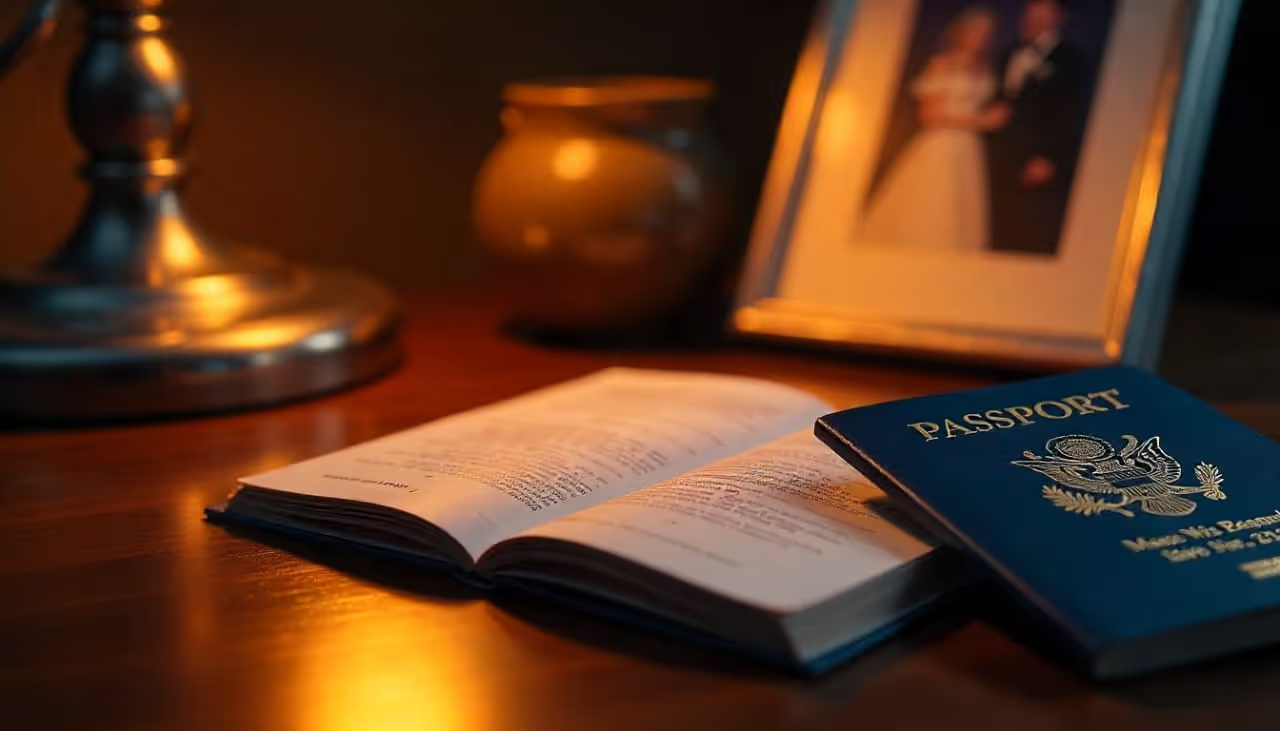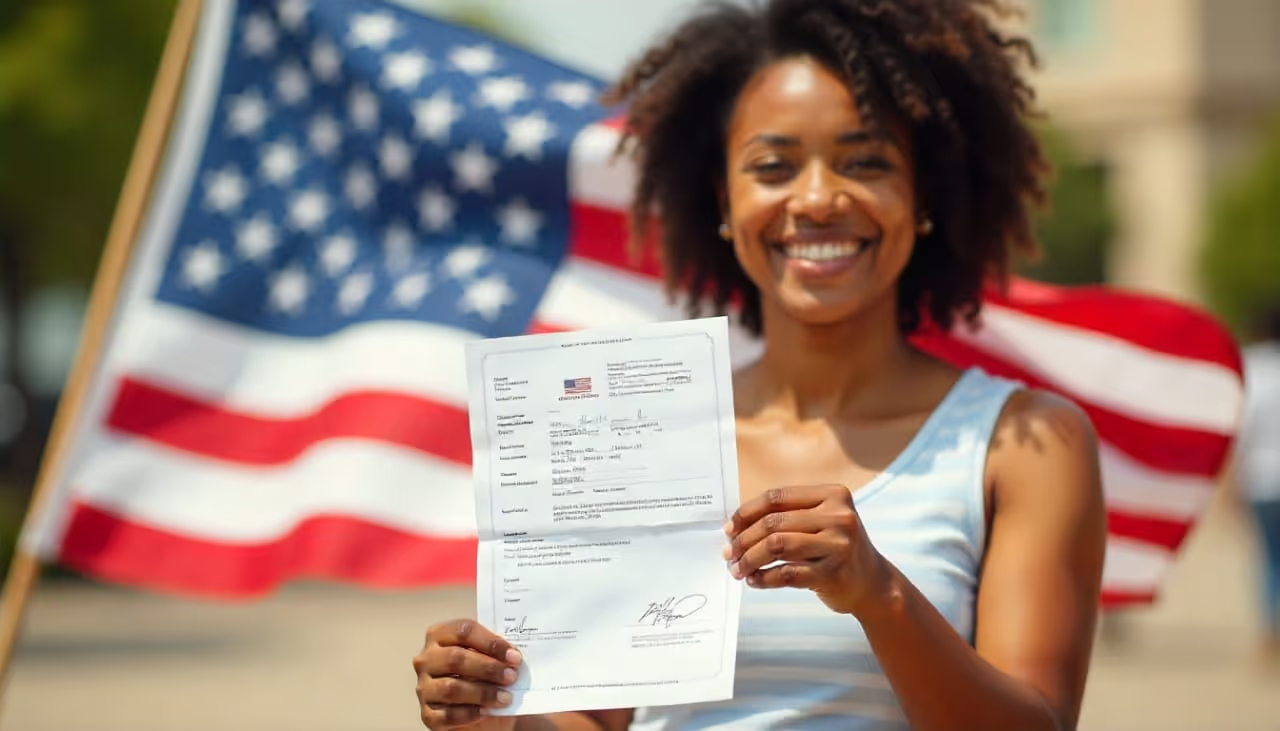.png)
.png)
If you’re sponsoring a marriage green card but plan to live abroad, don’t panic. Learn what to do if you move overseas and how to expedite your NVC visa application effectively.

Picture this: you’ve submitted a marriage green card petition for your spouse, and while waiting, life takes a turn. Maybe a job offer pulls you abroad. Or maybe you both planned to reunite elsewhere while the application was processing. Either way, the U.S. citizen or green card holder who filed the I-130 is now moving overseas — and panic starts to set in. What happens to the petition? Can you still sponsor your spouse if you’re not living in the U.S.?
This situation is far more common than you’d think. The good news? It’s not the end of the road — but there are some important things to know and steps to take.
Yes — you can still sponsor your spouse for a green card through consular processing, even while living abroad. But there’s a catch. U.S. immigration law requires the petitioner to maintain domicile in the United States. In simpler terms, you must intend to live in the U.S. permanently and be able to prove it.
Moving abroad temporarily doesn’t automatically destroy your eligibility as a sponsor — but it does raise questions. That’s why proactive planning and strong documentation are key. If you’re abroad and want to support your spouse’s green card journey, start documenting your intention to return home.
USCIS and the NVC both want proof that the sponsoring spouse plans to move back to the U.S. before or at the same time the immigrant spouse arrives. If you're abroad, you’ll likely be asked to show:
Your goal is to show that your presence abroad is temporary and that the U.S. remains your permanent home. Beyond Border can guide you on what evidence to gather and how to explain your intentions clearly.
Sometimes, delays at the National Visa Center (NVC) can create real-life problems — aging-out children, critical medical needs, or humanitarian crises. In those cases, you can request to expedite NVC visa application processing. But be aware: your case must already be documentarily qualified to even be considered for expedition.
Once that milestone is reached, you can email the NVC with a detailed request explaining the urgent circumstances and attaching supporting documents. If your expedite request is accepted, your case can be forwarded to the embassy much sooner — sometimes weeks or even months ahead of schedule.
The key to success here lies in evidence and clarity. Simply saying, “We’ve been apart too long” won’t be enough. Instead, focus on specific hardships:
Make sure your email to the NVC includes the case number, petitioner and beneficiary names, a detailed explanation, and your attachments. Use subject lines like “Request to Expedite NVC Stage – Case #XYZ.” If you’re unsure what to say or what to include, Beyond Border can help draft and review your expedite request.
You can only request expedition at a certain point: after your case is marked as "documentarily qualified" by the NVC. This means you’ve submitted all the financial and civil documents, and the NVC has accepted them. Before that milestone, your request won’t be considered.
If your situation involves immediate danger, medical crisis, or extreme hardship, make sure to mention how the delay in the NVC stage is actively worsening the problem. Using phrases like “expedite NVC processing due to medical emergency” or “request to expedite visa process NVC due to aging-out child” will help frame the urgency appropriately.

Once the NVC receives your request, they’ll forward it to the U.S. embassy or consulate that will be handling the visa interview. That office will decide whether or not to approve the expedite. You may receive a request for more evidence, or simply an answer saying your case has been sent to post. There’s no official timeline — some decisions come in days, others in weeks.
That’s why many families turn to services like Beyond Border to ensure their expedite request is structured, evidence-backed, and compelling.
If you’ve truly relocated outside the U.S. long-term and don’t plan to return, sponsoring a spouse becomes more complicated. You may no longer meet the domicile requirement — and unless you take legal steps to reestablish U.S. residence, the green card petition may stall or be denied.
In this case, you should consider:
Talk to an immigration advisor at Beyond Border to plan your return strategy and avoid delays.
Many couples choose to live together abroad while waiting for consular processing to finish. This is understandable — but it doesn’t change the sponsor’s obligations. The sponsoring spouse must still prove U.S. domicile or show strong evidence of future relocation. Without that, the green card cannot be issued.
This is especially important if you’re planning to expedite NVC application processing due to medical or humanitarian reasons. Your eligibility to file such a request also depends on whether the U.S. sponsor meets core legal criteria — like intent to live in the U.S.

No matter where you live during the process, remember that the rules don’t bend. USCIS still requires an affidavit of support, proof of U.S. domicile, and accurate financials. You must also report changes of address using USCIS systems, and continue responding to NVC and embassy requests on time. You can find more guidance directly from USCIS and USCIS.
Navigating all this while living overseas can be overwhelming — which is why more sponsors are leaning on trusted immigration professionals.
Can I sponsor my spouse for a green card if I’m living abroad?
Yes, but you must prove that you intend to reestablish U.S. domicile before or at the same time your spouse enters the U.S.
What counts as proof of U.S. domicile?
Job offers in the U.S., U.S. property leases, bank accounts, active tax filings, or evidence of plans to return — all help establish intent to reside in the U.S.
Does moving abroad delay the marriage green card process?
Not automatically, but if you can’t prove U.S. domicile, the application may be delayed or denied.
Can I still expedite NVC application processing while abroad?
Yes — as long as your case is documentarily qualified and you meet the criteria for urgent humanitarian, medical, or aging-out circumstances.
Does USCIS need to be notified if I change my address while abroad?
Yes. You must update your address with USCIS using the appropriate channels to stay compliant.
Moving abroad doesn’t disqualify you from sponsoring a spouse, but it does add layers of complexity. Whether you need to expedite NVC application steps or show proof of U.S. domicile, the process requires precision and a strong plan.
With the right guidance — and strong documentation — you can move forward confidently, no matter where you live. And when you need personalized help, Beyond Border is here to guide your family to the finish line.